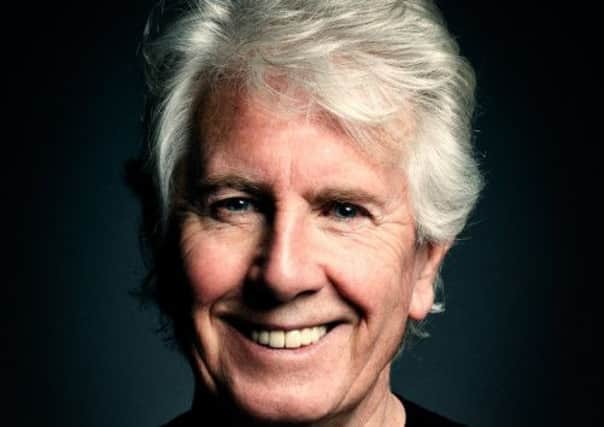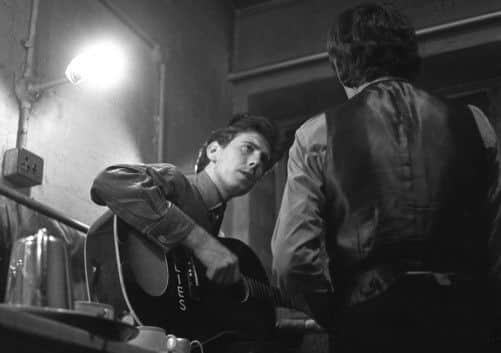Graham Nash: Wild tales of a Sixties rock music survivor


OF all the rock music stories that emerged from the cultural cauldron of the 1960s, Graham Nash’s is one of the most intriguing.
As lead singer and chief songwriter of The Hollies he was at the beating heart of swinging London and then with Crosby, Stills and Nash he found himself in the middle of California’s counterculture scene. It’s a remarkable tale and one he describes in his new book Wild Tales.
Advertisement
Hide AdAdvertisement
Hide AdHe decided to write his life story after becoming a grandfather for the first time. “I’d been asked to do an autobiography several times but I always thought it was something people did when they were old,” he says, speaking from a hotel room in New York.


“I have three great kids and now my first grand-daughter. I’m 71 and by the time she’s 15 I’ll be getting towards 90 and I want her to know who her grandfather is.”
The ensuing book is a colourful and frank account of his journey from postwar Britain in a one-up, two-down terrace in the north of England, to living a rock star’s life in sun-kissed Los Angeles. It’s a fascinating story – featuring an array of famous names including John Lennon, Paul Simon and Joni Mitchell, as well as three American presidents – and one he’ll be discussing when he makes his sell-out appearance at the Ilkley Literature Festival tomorrow night.
Nash was born into a working class family from Salford during the Second World War. As with many youngsters who were teenagers during the late 50s he was gripped by rock ‘n’ roll. But unlike most of his peers, he had a burning desire to be a musician.
Advertisement
Hide AdAdvertisement
Hide Ad“It spoke to my soul,” he says, of early rock ‘n’ roll. He describes the moment he heard a song by the Everly Brothers for the first time. “I was at a Catholic school dance and I was walking across the dance floor when Bye bye love started blasting out of the speakers and it just floored me, I couldn’t believe how good it was.”
He saved up to buy a cheap guitar and taught himself how to play. He and his childhood friend Allan Clarke formed various bands before The Hollies finally came into being in late 1962. Once together, the band’s rise was rapid and within four months of forming they were recording in the studios at Abbey Road, home to a certain Liverpudlian group.
Over the next five years he enjoyed all the trappings of a pop star’s life as The Hollies established themselves as one of the most popular bands in the country, producing a string of top 10 hits including Look Through Any Window, Bus Stop, On a Carousel and Carrie Anne.
But it was during a US tour with the band that he met Mama Cass who introduced him to ex-Byrd David Crosby. He then met a young folk singer called Joni Mitchell which irrevocably changed his life. He fell in love with Mitchell and left his wife and quit his band to move to California so they could be together.
Advertisement
Hide AdAdvertisement
Hide AdIt was while with her that he first heard Crosby and Stephen Stills, whose band Buffalo Springfield had recently imploded, sing together. Mesmerised by their harmonies he joined in, something that stopped all three of them in their tracks – and the first great supergroup was born.
“People thought I was absolutely crazy. ‘You’re leaving The Hollies? You must be bloody daft,’” he says. “But they hadn’t heard David, Stephen and me singing together and I had, and I knew it was special. I had to go back home and basically undo my entire life.” This must have been a wrench? “It was surprisingly easy. That might sound strange but I’d heard the sound of us singing and I wanted more.”
He moved to California in 1968 settling in Laurel Canyon, then a hive of artists and musicians. “It’s seen now as this almost mythical place and at the time there was an incredible sense of freedom, you had the feeling you could do anything.”
The new band found themselves headlining a music festival near a town called Woodstock, where they ended up playing in front of an estimated crowd of 400,000.
Advertisement
Hide AdAdvertisement
Hide Ad“It was only the second time we’d ever played live in front of a proper audience, but the atmosphere was just incredible. We were good, although if you watch the film footage you can see Stephen Stills tuning his guitar while we were doing Suite: Judy Blue Eyes,” he says, laughing.
Crosby, Stills, Nash and Young (Neil Young joined them periodically over the years), became global stars, but with the fame and adulation came the excess.
“The more famous you got, the more records you sold and the more money you got, which meant you could get better drugs. In hindsight it was a silly way to go, but that’s how it was.
“I was high on marijuana for most of the time. People say to me ‘Would the music have been better if you were straight?’ And I don’t know the answer.”
Advertisement
Hide AdAdvertisement
Hide AdBut they survived what he calls their earlier “monstrous egos” and Crosby’s descent into “cocaine madness” and continue to influence bands today.
So what made their three-piece harmonies so special? “I’m not sure, maybe it was the sound of two Americans and an Englishman and the way it blended together, but it was an incredible sound. Whatever talent we have as songwriters and musicians, people would stop and listen when we played music.”
And they still do. “In a troubled world I think our music has a soothing and calming effect, and even to this day when David, Stephen, Neil and I play together we’re still loved, and that’s no bad thing.”
Wild Tales: A Rock & Roll Life, published by Viking, is out now priced £25.
A host of literary fests
Advertisement
Hide AdAdvertisement
Hide AdGRAHAM Nash will be appearing at the Ilkley Literature Festival at a sold-out event, but there are plenty of others that still have tickets available. The festival runs until Oct 20. Details www.ilkleyliteraturefestival.org.uk
Yorkshire also plays host the the Morley Literature Festival, to Oct 13, with a series of events and workshops in the town. Details at http://www.morleyliteraturefestival.co.uk
Sheffield’s Literature Festival, Off the Shelf, runs until Nov 2, providing sustenance to voracious readers well into the autumn months. Details for all events are at www.welcometosheffield.co.uk